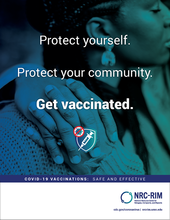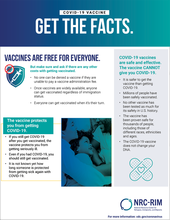
Invest in your staff and your business
Employers can play a key role in ensuring their employees can confidently access COVID-19 vaccines, which is the best way to prevent the spread of COVID-19 in the workplace. This not only protects the lives and well-being of your employees, it protects your business from major disruptions.
When COVID-19 spreads in the workplace, it can lead to:
- Employee absences
- Employees with lasting health complications
- Severe illness and death among employees
- Costly cleaning requirements
- Disruptions of normal business operations
- Lost productivity
- Business closures
Many businesses are requiring their employees receive a COVID-19 vaccine. There is now a federal COVID-19 vaccine mandate for companies employing 100 or more people. There are a few things you can do to implement a vaccine mandate in your business in a way that builds trust, protects relationships, and honors the cultural expectations of your staff.
Employees who are refugees, immigrants and migrants
Cultural, religious, and linguistic differences may present barriers for employers and employees from refugee, immigrant, and migrant (RIM) communities from creating a safe working environment. This guide provides resources that can help employers overcome these barriers, speak with their employees about COVID-19 vaccines, and promote vaccine acceptance.
Some refugees, immigrant and migrants may face barriers to getting their vaccines because of their work schedules, language barriers, lack of transportation, health insurance status, or other concerns. Making vaccine access convenient is one way to encourage compliance among workers and their families.
What to do
- Partner with your local health department to provide vaccines at your workplace, and learn how to create a welcoming and inclusive vaccine site
- Explore partnerships that will facilitate mobile vaccine clinics to the job site, and learn how to implement a successful mobile event
- Plan for vaccine clinics that are honor the needs and experiences of migrant workers; immigrant dairy workers; and refugees, immigrants and migrants more generally
- Offer financial or other incentives for employees to get vaccinated; partner with community leaders to ensure the incentives are culturally appropriate.
Employers of people from refugee, immigrant, and migrant communities, must consider the importance of family and community to their employees. Vaccine hesitancy can come from a family or a community’s perspective of COVID-19 disease and vaccines. For example:
- Some employees may not want the vaccine unless their entire family has the opportunity to get vaccinated together.
- Some families may not want to get vaccinated until the leader(s) of the family do so first. This person may be the mother, father, or the eldest member.
What to do
Employers can provide on-site COVID-19 vaccination programs, inviting employees and their family members to learn about and receive their vaccines together.
- Invite families to attend vaccination information sessions, and hold these sessions at a time when they are most likely to attend.
- Invite families to attend vaccination clinics
Language differences can impact a person’s decision to vaccinate, as they may have received little to no information on COVID-19 vaccine options in their native language.
What to do
- Distribute translated vaccine education materials from trusted sources; the Get Vaccinated and Get the Facts campaigns have customizable templates in more than 40 languages.
- Consider creating your own campaign using Makespace, and get inspiration from others by checking out the Vaccination Is campaign
- Use a rigorous translation process for any materials employers create on their own.
- Invite guest speakers who speak the preferred language of employees to any vaccine events, or provide interpretation services
Employees may base a vaccination decision on faith-based and/or cultural community views on vaccinations and illness. It is important to understand the background of employees and acknowledge their concerns and their faith-based approach.
What to do
- Invite a trusted person in the religious or cultural community to speak to employees about vaccines.
- Partner with religious leaders or organizations already providing COVID-19 vaccine education to educate employees on COVID-19 and the vaccine.
- Support employees as COVID-19 champions within the workplace. They can share their COVID-19 story or serve as a liaison between workers and management with regard to workplace policies, and more. Conversation guides are a good tool for lead workers like this.
Side effects from the COVID-19 vaccine are common and can affect people’s ability to perform daily activities for 1-3 days on average. Employees who have been recently vaccinated may not be able to perform some of their work duties, and some may need to rest for the remainder of the day or for a few days.
Offering employees paid time off may seem costly for employers in terms of pay and lost productivity. However, it will be much more costly to have a COVID-19 outbreak among staff. People with COVID-19 infections will need many more days off to quarantine, and could have complications like lung or brain damage that last months or longer.
What to do
- Consider common post-vaccine side effects when creating employee work plans and schedules. This could mean scheduling employees for less strenuous work post-vaccination. It could also mean offering multiple vaccine events, each for only a portion of staff (10-25%) at one time. This way excessive absences will not overwhelm your business.
- Offer paid sick days post-vaccination to support employees who choose to get vaccinated. Even if it is not possible to offer paid sick days, a guarantee that an employee who needs time off to recover from vaccine side effects will not be subject to disciplinary action is a helpful alternative incentive.
- Offer paid sick days for an employee to care for an immediate family member who gets vaccinated. When entire families and communities are vaccinated, the risk to your employees is even lower.
Some employees may not be ready for a vaccine, or may have medical or religious reasons why they cannot be vaccinated. Bringing testing for COVID-19 to your workplace can help stop the spread to other workers, because it allows people who are infected to isolate sooner and start treatment earlier.
What to do
- Consider partnering with Federally Qualified Health Centers (FQHCs) and community health workers to create a testing plan that will work for your employees.
- Create a testing program that honors the needs and experiences of refugees, immigrants and migrants
- Organize a mobile COVID-19 testing event at your job site
Vaccines alone are not enough to fully protect your workplace from the pandemic. Though vaccines are one of the most important tools available for COVID-19 prevention, other important strategies are needed.
What you can do
- Improve ventilation and air filtration for indoor environments
- Ensure workers have adequate personal protective equipment
- Offer of hand sanitizer and hand washing stations to encourage safe personal hygiene practices
- Encourage social distancing by altering the layout of the workplace
- Accommodate symptomatic workers with paid sick leave to ensure they do not risk coming to work with COVID-19
Most states in the U.S have issued COVID-related guidance for employers and information for employees on rights and requirements related to working within their state. Employers and employees should be encouraged to look up specific rules regarding work and COVID-19 in their city and state.
Employees generally have the right to the following without fear of retaliation:
- Ask questions related to workplace safety
- Report unsafe working conditions
- Refuse to work in conditions where they experience being exposed to COVID-19 or any other form of injury or harm.
Employers generally have the right to:
- Require medical testing for COVID-19
- Require COVID-19 vaccinations, as long as the employer does not harass nor discriminate employees and job applicants.


